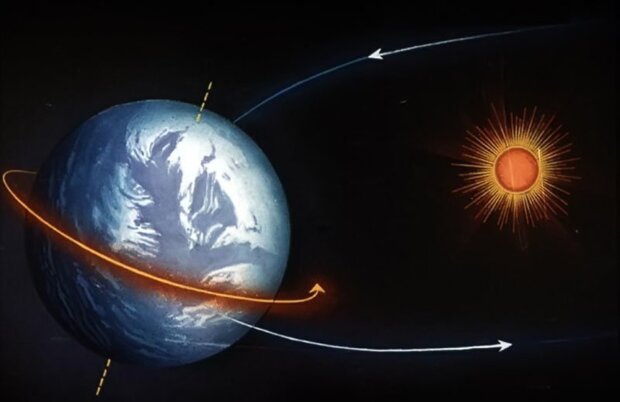It rotates around its axis like a spinning top, which is why we experience day and night. It does so at the equatorial speed of 1,674 km/h (1,040 mph).
That's 465 meters per second—a remarkable figure. Some may wonder, why don't we feel the Earth's rotation?
People can faint while riding a carousel at an amusement park, which moves much slower than the Earth.

Perhaps scientists are once again hiding the truth, and in reality, our planet is stationary?
In fact, answering the question of "why don't we notice the Earth's rotation" is quite easy if we draw a simple analogy. Imagine you're on an airplane.
From the outside, you can see that the aircraft is moving forward, and it can be very fast.

However, when you're inside, you don't sense the motion and can walk around the cabin, sit, and lie down as if the plane is completely still.
The reason is that you're moving at the same speed as the transport, and within its "frame of reference," as physicists say, you're at rest.
We can't perceive speed, but we can sense acceleration. You'll only notice the plane's motion when it accelerates or decelerates. That's why during takeoff and landing, passengers are asked to remain seated and fasten their seatbelts, or else they'll end up on the floor.

If the Earth were to suddenly stop, we would feel it, and we wouldn't survive such a catastrophe. But the Earth has no intention of speeding up or slowing down, so we don't notice its rotation.
The atmosphere, all objects on the surface, and ourselves—all of it rotates together with the planet at the same speed of 465 meters per second. And with respect to the Earth itself, we remain motionless.
Newton's second law states that force equals mass times acceleration. Your body represents that mass. In the case of the Earth, the acceleration is zero. Therefore, no force acts upon your body, and it remains at rest.

Although, strictly speaking, the Earth does experience a slight deceleration. The Moon slightly slows down the rotation of our planet, causing it to slow down by about two-thousandths of a second each day.
Studies show that 350 million years ago, a day consisted of only 23 hours because the Earth spun faster.
So, there is indeed a small deceleration acting on your body on the planet's surface—physicists call it negative acceleration. However, it's so insignificant that you simply don't notice it.

Read more: The most dangerous toys for children: which ones should not be purchased in stores
As we wrote earlier: A 12-year-old boy has obtained five college degrees: how did he manage it





































